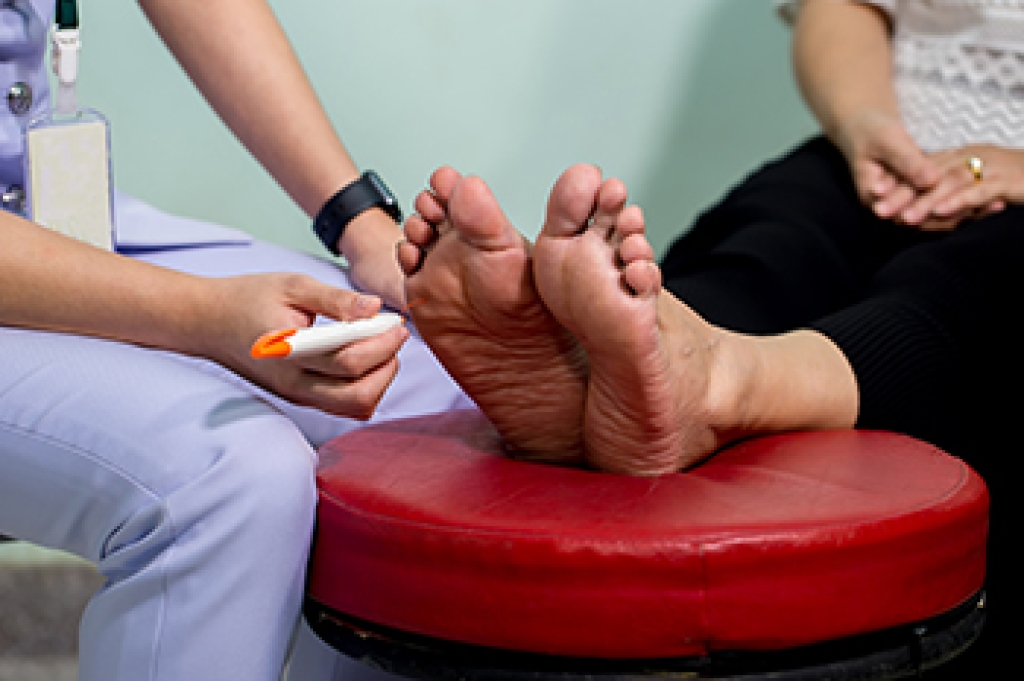Connect With Us
Blog
Blog
Orthotic Devices
 Orthotics are devices inserted into shoes to support, align, or improve the function of the feet. They help relieve pain and prevent injuries by redistributing pressure and providing support to specific areas of the foot. This can alleviate issues such as plantar fasciitis, flat feet, and overpronation, reducing strain on muscles and joints. Although there are various types of orthotics, rigid, semi-rigid, and soft, determining which type works best for an individual's condition can be somewhat unpredictable. The effectiveness of orthotics largely depends on the specific foot problem and the unique biomechanics of the patient. For optimal results, it is suggested that if you are interested in understanding more about orthotics, you schedule an appointment with a podiatrist who can perform a thorough evaluation of your foot condition and overall health and determine if orthotics are right for you.
Orthotics are devices inserted into shoes to support, align, or improve the function of the feet. They help relieve pain and prevent injuries by redistributing pressure and providing support to specific areas of the foot. This can alleviate issues such as plantar fasciitis, flat feet, and overpronation, reducing strain on muscles and joints. Although there are various types of orthotics, rigid, semi-rigid, and soft, determining which type works best for an individual's condition can be somewhat unpredictable. The effectiveness of orthotics largely depends on the specific foot problem and the unique biomechanics of the patient. For optimal results, it is suggested that if you are interested in understanding more about orthotics, you schedule an appointment with a podiatrist who can perform a thorough evaluation of your foot condition and overall health and determine if orthotics are right for you.
If you are having discomfort in your feet and would like to try orthotics, contact Raul Hidalgo DPM from South Texas Foot & Ankle Care. Our doctor can provide the care you need to keep you pain-free and on your feet.
What Are Orthotics?
Orthotics are inserts you can place into your shoes to help with a variety of foot problems such as flat feet or foot pain. Orthotics provide relief and comfort for minor foot and heel pain but can’t correct serious biomechanical problems in your feet.
Over-the-Counter Inserts
Orthotics come in a wide variety of over-the-counter inserts that are used to treat foot pain, heel pain, and minor problems. For example, arch supports can be inserted into your shoes to help correct overarched or flat feet, while gel insoles are often used because they provide comfort and relief from foot and heel pain by alleviating pressure.
Prescription Orthotics
If over-the-counter inserts don’t work for you or if you have a more severe foot concern, it is possible to have your podiatrist prescribe custom orthotics. These high-quality inserts are designed to treat problems such as abnormal motion, plantar fasciitis, and severe forms of heel pain. They can even be used to help patients suffering from diabetes by treating foot ulcers and painful calluses and are usually molded to your feet individually, which allows them to provide full support and comfort.
If you are experiencing minor to severe foot or heel pain, it’s recommended to speak with your podiatrist about the possibilities of using orthotics. A podiatrist can determine which type of orthotic is right for you and allow you to take the first steps towards being pain-free.
If you have any questions, please feel free to contact our office located in San Antonio, TX . We offer the newest diagnostic and treatment technologies for all your foot care needs.
Symptoms of Diabetic Peripheral Neuropathy

Diabetic peripheral neuropathy is a common issue for individuals with type 2 diabetes, with nearly half experiencing this complication. This condition arises when prolonged high blood sugar levels cause damage to the nerves, especially in the feet and lower legs. Symptoms of peripheral neuropathy include numbness, tingling, burning sensations, and muscle weakness, which can progressively disrupt daily activities. A significant concern is “diabetic foot,” where the loss of feeling and poor blood flow can lead to ulcers, infections, and in severe cases loss of limb. Diabetic neuropathy also can increase the risk of falls and fractures due to lack of sensation in the feet, impaired balance and reduced coordination. Factors such as smoking, high blood pressure, obesity, and cholesterol issues can further increase the risk of developing this diabetic peripheral neuropathy. Early detection and proper management are of extreme importance. If you notice unusual sensations in your feet or lower legs, especially persistent numbness or pain, it is suggested that you make an appointment with a podiatrist who can conduct a thorough examination and recommend a personalized treatment plan.
Neuropathy
Neuropathy can be a potentially serious condition, especially if it is left undiagnosed. If you have any concerns that you may be experiencing nerve loss in your feet, consult with Raul Hidalgo DPM from South Texas Foot & Ankle Care. Our doctor will assess your condition and provide you with quality foot and ankle treatment for neuropathy.
What Is Neuropathy?
Neuropathy is a condition that leads to damage to the nerves in the body. Peripheral neuropathy, or neuropathy that affects your peripheral nervous system, usually occurs in the feet. Neuropathy can be triggered by a number of different causes. Such causes include diabetes, infections, cancers, disorders, and toxic substances.
Symptoms of Neuropathy Include:
- Numbness
- Sensation loss
- Prickling and tingling sensations
- Throbbing, freezing, burning pains
- Muscle weakness
Those with diabetes are at serious risk due to being unable to feel an ulcer on their feet. Diabetics usually also suffer from poor blood circulation. This can lead to the wound not healing, infections occurring, and the limb may have to be amputated.
Treatment
To treat neuropathy in the foot, podiatrists will first diagnose the cause of the neuropathy. Figuring out the underlying cause of the neuropathy will allow the podiatrist to prescribe the best treatment, whether it be caused by diabetes, toxic substance exposure, infection, etc. If the nerve has not died, then it’s possible that sensation may be able to return to the foot.
Pain medication may be issued for pain. Electrical nerve stimulation can be used to stimulate nerves. If the neuropathy is caused from pressure on the nerves, then surgery may be necessary.
If you have any questions, please feel free to contact our office located in San Antonio, TX . We offer the newest diagnostic and treatment technologies for all your foot care needs.
Blog Archives
- 2026
- 2025
- 2024
- 2023
- 2022
- 2021
- 2018
- 2017



